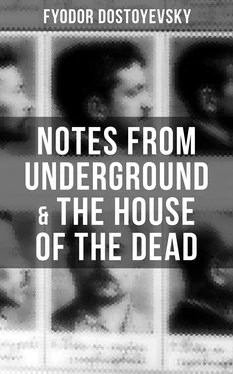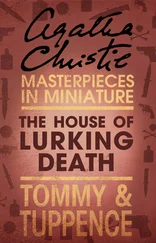Before I had been half an hour in the prison he passed by and touched me gently on the shoulder, smiling innocently. I did not at first understand what he meant, for he spoke Russian very badly; but soon afterwards he passed again, and, with a friendly smile, again touched me on the shoulder. For three days running he repeated this strange proceeding. As I soon found out, he wished to show that he pitied me, and that he felt how painful my first hours of imprisonment must be. He wished to testify his sympathy, to keep up my spirits, and to assure me of his good will. Kind innocent Nourra!
Of the three Daghestan Tartars, all brothers, the elder two were well-developed men, while the youngest, Ali, was not more than twenty-two and looked still younger. He slept by my side, and when I observed his frank, intelligent countenance, thoroughly natural, I was at once attracted to him and thanked my fate that I had him for a neighbour and not some other prisoner. His whole soul could be read in his beaming countenance. His confident smile had a certain childish simplicity. His large black eyes expressed such friendliness, such tender feeling, that I always took pleasure in looking at him: it was a relief to me in moments of sadness and anguish. One day his eldest brother-he had five, of whom two were working in the mines of Siberia-had ordered him to take his yataghan, mount on horseback, and follow him. The respect of the mountaineers for their elders is so great that young Ali dared not ask the object of the expedition. He probably knew nothing about it, nor did his brothers consider it necessary to tell him. They were going to plunder the caravan of a rich Armenian merchant, and they succeeded in their enterprise. They assassinated the merchant and stole his goods. Unhappily for them, their crime was discovered. They were tried, flogged, and sent to hard labour in Siberia. The court admitted no extenuating circumstances, except in the case of Ali. He was condemned to the minimum punishment-four years’ imprisonment. His brothers loved him, with a father’s rather than a brother’s love. He was the only consolation of their exile. Dull and sad as a rule, they had always a smile for him. When they spoke to him (which they rarely did for they looked upon him as a child to whom it would be useless to speak seriously) their forbidding countenances lightened up. I always used to fancy they addressed him in a jocular tone, as they would an infant. When he replied the brothers exchanged glances and smiled goodnaturedly.
His respect for them forbade him to speak to them first. How this young man preserved his tender heart, his native honesty, his frank cordiality without becoming perverted and corrupted during bis period of hard labour is quite inexplicable. In spite of his gentleness, however, he had a strong stoical nature, as I later discovered. Chaste as a young girl, everything that was foul, cynical, shameful, or unjust filled his fine black eyes with indignation, and made them finer than ever. Although no coward, he would allow himself to be insulted with impunity. He avoided quarrels and abuse, and maintained his dignity. With whom, indeed, was he to quarrel? Everyone loved and cherished him.
At first he was only polite to me; but little by little we got into the habit of talking together in the evening. In a few months he had learnt to speak Russian perfectly, whereas his brothers never gained a correct knowledge of the language. He was intelligent, and at the same time modest and full of delicate feeling.
Ah was an exceptional being, and I always think of my meeting him as one of the lucky events of my life. There are some natures so spontaneously good, and endowed by God with such great qualities, that the idea of their perversion seems absurd. One is never anxious about them. Accordingly I never feared for Ah. Where is he now?
One day, some considerable time after my arrival at the prison, I was stretched out on my camp-bedstead agitated by painful thoughts. Ali, though always industrious, was not working at that moment. It was not yet time for him to retire to bed. His brothers, who were celebrating some Mussulman festival, were also at rest. Ali lay with his head in his hands in a state of reverie. Suddenly he said to me:
‘Well, you’re very sad!’
I gazed at him in astonishment. Such a remark from Ali, who was always so delicate, so full of tact, seemed strange. But on looking closer I saw so much grief, so much repressed suffering in his countenance-suffering caused no doubt by sudden memories-that I understood his anguish and told him so. He sighed deeply, and smiled with a melancholy air. I always liked his charming smile: it showed two rows of teeth which the world’s greatest beauty might have envied.
‘Ah, I suppose you were thinking how this festival is celebrated in Daghestan. Ah, you were happy there.’
‘Yes,’ he replied with enthusiasm, and his eyes sparkled. ‘How did you know I was thinking of such things?’
‘How could I fail to know? You were much better off than you are here.’
‘Why do you say that?’
‘What beautiful flowers there are in your country! Yes,it’s a real paradise.’’Please, say no more.’
He was much agitated.
‘Listen, Ali. Have you a sister?’
‘Yes. Why do you ask?’
‘She must have been very beautiful if she is like you?’
‘Oh, there’s no comparison between us. In all Daghestan you’d never meet so beautiful a girl. My sister is, indeed, charming. I am sure that you’ve never seen anyone like her. My mother also is very handsome.’
‘And your mother was fond of you?’
‘What do you mean? Of course she was. I’m sure she has died of grief, she was so fond of me. I was her favourite child. Yes, she loved me more than my sister, more than all the others. This very night she appeared to me in a dream and shed tears for me.’
He was silent, and never spoke again for the rest of the night; but from that moment he sought my company and my conversation, although he remained most respectful and never ventured to address me first. On the other hand he was happy when I spoke to him. He often talked of the Caucasus and of his past life. His brothers did not forbid him to converse with me; in fact I think they even encouraged him to do so, and when they saw that I was fond of him they became more affable towards me.
Ali often helped me in my work. In barracks he did everything he could to please me and save me trouble. In bis attentions there was neither servility nor the hope of any advantage, but only a warm, cordial feeling which he did not try to hide. He had an extraordinary aptitude for the mechanical arts: he had learnt to sew very tolerably and to mend boots, and even understood something of carpentry -everything, in short, that could be learnt in prison. His brothers were proud of him.
‘Listen, Ali,’ I said to him one day, ‘why don’t you learn to read and write Russian? It might be very useful to you here in Siberia.’
‘I should like to, but who would teach me?’
‘There are plenty of people here who can read and write. I’ll teach you myself if you like.’
‘Oh, do teach me, please,’ said Ali, raising himself up in bed. He joined his hands and looked at me with a suppliant air.
We set to work the very next evening. I had a Russian translation of the New Testament, the only book that was not forbidden in prison. With that book alone, and without an alphabet, Ali learned to read in a few weeks, and after a few months he could do so perfectly. He brought an extraordinary zeal and warmth to his studies.
One day we were reading together the Sermon on the Mount. I noticed that he read certain passages with much feeling and I asked him if he liked the Gospel. He glanced up at me, and his face suddenly lighted up.
Читать дальше












